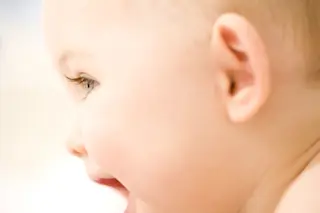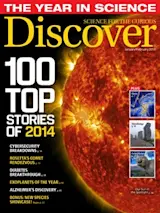How does a babbling baby become a talking tyke? In June, researchers found part of the answer. Toward the end of the first year of life, they discovered, two brain areas begin coordinating to help babies figure out speech.
Until 6 or 7 months of age, babies can easily distinguish vowels and consonants from all languages. But by about 11 or 12 months, they’ve homed in on their native language — the one they’ve heard most — and started ignoring foreign sounds. Baby’s first word follows soon after.
To learn how this transition into speech occurs in the brain, the University of Washington’s Patricia Kuhl played babies in both age ranges separate recordings of their native tongue and a foreign one while measuring their brain activity.
When 7-month-olds heard either language, they showed similar activity levels in both the auditory system, which perceives sounds, and the motor system, which is ...















